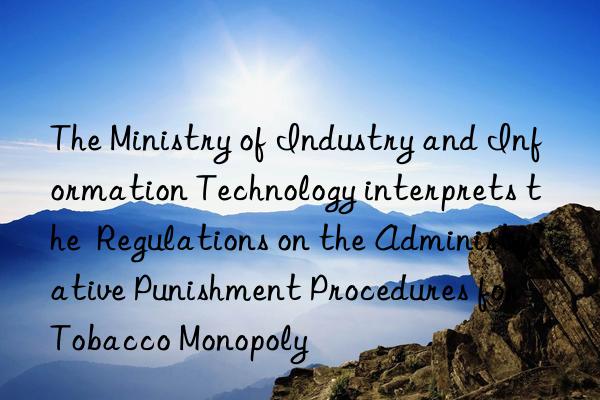
According to the WeChat official account of "Industry and Information Technology", on May 16, the Ministry of Industry and Information Technology revised and announced the "Procedures for Administrative Punishment of Tobacco Monopoly" (Decree No. 61 of the Ministry of Industry and Information Technology, hereinafter referred to as "Regulation"). In order to better understand and implement the "Regulations", the comrades in charge of the Industrial Policy and Regulations Department of the Ministry of Industry and Information Technology interpreted the "Regulations".
What is the background of the revision of the Regulations?
In 2010, the Ministry of Industry and Information Technology formulated and promulgated the current "Regulations on Administrative Punishment Procedures for Tobacco Monopoly", which clarified the specific procedures for implementing administrative penalties in the field of tobacco monopoly It has played an important role in implementing, supervising the administration of tobacco monopoly bureaus at all levels according to law, and safeguarding the legitimate rights and interests of administrative counterparts. In 2021, the newly revised "Administrative Punishment Law" was officially implemented, which clarified the concept of administrative punishment, added new types of administrative punishment, expanded the scope of hearings, clarified the scope of legal review, and added a new system of non-punishment for first violations. The time limit for handling cases has been clarified, and systems such as the announcement of major administrative penalties have been established. Part of the content of the current "Procedures for Administrative Punishment of Tobacco Monopoly" needs to be revised and improved according to the "Administrative Punishment Law". "Corresponding adjustments and supplements were made to meet the needs of the new development situation.
During the revision process of the "Regulations", what kind of work has been mainly carried out?
During the revision process, the following tasks were mainly carried out: First, research and discussions were carried out. Systematically sort out laws and regulations and regulations of relevant departments, summarize practical experience, revise and improve relevant systems, and form the "Regulations (Draft for Comment)". The second is to listen to opinions from all sides. Solicit opinions from the Supreme People's Court, the Supreme People's Procuratorate, and relevant departments of the State Council in writing, and publicly solicit opinions from the public. The third is to carefully study the opinions of various parties, constantly improve the relevant system, and form the "Regulations (Revised Draft)".
On April 26, 2023, the Ministerial Meeting of the Ministry of Industry and Information Technology reviewed and approved the "Regulations (Revised Draft)".
What has been revised in the Regulations?
The "Regulations" mainly revised the following systems:
(1) Adjust jurisdiction and applicable regulations. Amended and improved the joint jurisdiction dispute handling, transfer of suspected criminal cases and other regulations. Supplemented the application of relevant laws: added the applicable provisions of "confiscation of illegal income", and clarified the scope of "illegal income"; supplemented that the same illegal act shall not be punished repeatedly, lighter or mitigated administrative punishment, no punishment for the first violation, administrative Judgment criteria, etc.
(2) The chapter "General Provisions" is added. Adjust the current "Procedures for Tobacco Monopoly Administrative Punishment Procedures" in the "General Procedures" chapter on law enforcement qualifications, recusal, prior notification obligations, types of evidence, etc. The program is revised and perfected. In order to implement the relevant requirements of the "Three Systems", regulations on publicizing tobacco monopoly administrative penalty information, recording the entire process of law enforcement, and disclosing administrative penalty decisions in accordance with the law have been added.
(3) Improving the regulations on summary procedures and ordinary procedures. Increase the amount of cases involved in the application of simplified procedures. Add regulations such as the right of the parties concerned to refuse to accept investigations and the obligation of the parties to cooperate if law enforcement officers fail to show their law enforcement credentials. Supplementary electronic data evidence types and evidence collection procedures requirements. Clarify the requirements that no decision on administrative punishment shall be made without a legal system review, and that legal system review personnel shall obtain legal professional qualifications. Adjust the time limit and specific circumstances for making administrative punishment decisions. Increase the electronic delivery method, and improve the applicable conditions and time limit for announcement delivery.
(4) Adjust the hearing procedure regulations. Expand the scope of application of hearings, extend the time limit for parties to apply for hearings, and clarify the requirements that decisions should be made in conjunction with hearing transcripts. Further standardize the hearing procedures and increase the time limit for the Tobacco Monopoly Bureau to organize hearings after receiving applications. Supplement the provision that the party's refusal to attend the hearing is regarded as a waiver of rights, and at the same time adjust the detailed provisions in the hearing.
(5) Improving regulations on the implementation of administrative penalties and law enforcement supervision. Clarify the procedures for delaying the payment of fines, increase administrative law enforcement review, assessment, and social supervision mechanisms, and at the same time strengthen accountability, including law enforcement without law enforcement qualifications, and cases that meet the filing standards not being filed in a timely manner as accountability situations. In order to implement the latest revision of the "Regulations on the Implementation of the Tobacco Monopoly Law", it is clear that these regulations apply to the implementation of administrative penalties for new types of tobacco violations such as e-cigarettes.



 微信扫一扫打赏
微信扫一扫打赏
